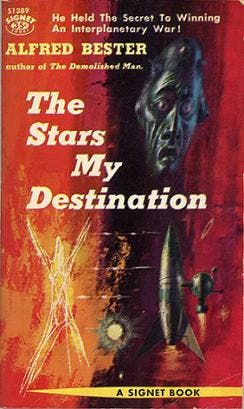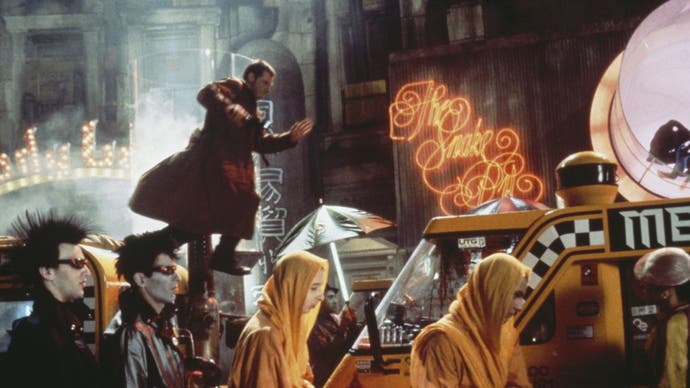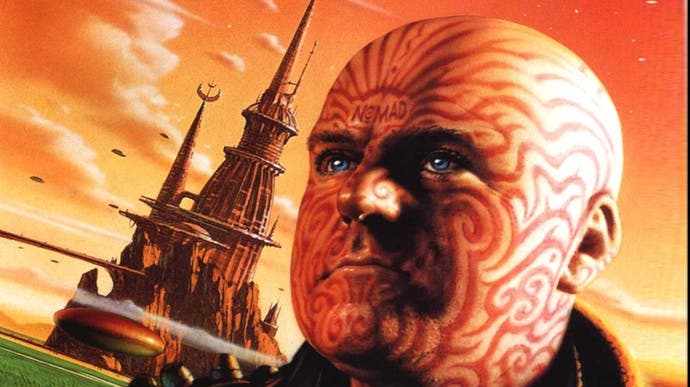Why do we read cyberpunk?
Looking back at looking forward.
Why do we read cyberpunk?
Oh, cautionary tales, obviously. Cyberpunk stories show us bleak, frightening worlds where corporate power, overpopulation and mass surveillance have formed dark, soulless societies in which the individual means nothing and those in control care only about profit. They're warnings, something to frighten us away from the right decisions.
No, hold on, clearly it's about transhumanism and the ever-blurring line between mortal and machine. Augmentation, alteration, enhancement through technology; narratives that push our definitions of what humanity means and where science might take us within our own lifetimes.
You idiot, it's because they're the purest expression of revolutionary zeal! Cyberpunk, remember? They're calls-to-arms that drive us to rebel against our corporate overlords! They show us that one person can always make a difference! They prove the importance of unfettered communication and how these vast systems that surround us still aren't so immune to change when we stand firm and resist!
Stupid question, I suppose. The purpose of every story is different, even within the same genre, and yet having consumed about a dozen cyberpunk books, films, games and comics over the last few months alone, I still find the question lingers with me - though maybe not in a good way.
Because all the answers mentioned above? I'm not sure I'm really seeing them, even when they're theoretically the case. Something's gone wrong. Something's been lost. I'm not feeling that spark anymore. I'm sorry cyberpunk, it's not you, it's me.
Or hold on, maybe it is you! One book I tackled recently was The Stars, My Destination by Alfred Bester, the seminal 1956 sci-fi classic that arguably started the whole genre (no, it wasn't Gibson or Philip K. Dick like we all remember, Bester beat them to it). And despite coming twenty-five years early, it's clearly a form of proto-punk. Giant corporations ruling a horrible vertical society, a hero who's more bitterly brutal than Flash-Gordon-flashy, and a highly-destructive doodad that every person in power wants to get ahold of, "PyrE". Extra cyberpoints for the silly spelling.

I joke, but TSMD is a decent read if you have a spare weekend coming up. Bester knows how to write a solid set-up, even if it's pretty dated in some of its attitudes, and he has a great hook woven in: five centuries from now, humanity has colonised the solar system and everybody has learned how to teleport using nothing more than inherent telepathy. Different people have mastered it to different degrees and nobody's worked out how to "jaunte" between planets yet, but it's changed the way we think and the way our society functions. Not only that, but the protagonist, Gully Foyle, is basically Edmond Dantes with more tattoos, which I'm all in favour of. Foyle is stranded on a destroyed spaceship in the book's introduction and nearly loses his mind with rage when a passing ship clearly ignores his distress signal after six months living in the isolation of deep space. Managing to repair his own craft and make it back to civilisation, Foyle begins a campaign of revenge against the crew and owners of the ship that spurned him, only to realise that there's been a lot more going on behind the scenes than he realises... and that he's managed to get stuck in the middle of a massive conspiracy.
Like I said, it's worth a shot, as the excellent premise is more than enough to push through the occasional faltering execution (Bester has some trouble with pacing, and Foyle is not the easiest protagonist to spend a whole book with). Yet it's a bit odd that a story written in the 50s somehow feels imaginative compared to the rest of the genre that comes afterwards... but thinking on it, that might be the problem in a nutshell.
Because I find that the most interesting thing in any cyberpunk story I try out these days is whatever it's doing thatisn't traditional cyberpunk. The best bit of The Stars, My Destination is the teleportation gimmick and the outer-space stuff. In Electric Sheep it's examining changed societal attitudes and priorities after the damage wrought by nuclear war. In Shadowrun it's the whole magical angle, mixing sci-fi and fantasy elements to create something new and comparatively fresh.

The worst thing that ever happened to cyberpunk was that it became a recognised genre. With genres come tropes, and with tropes comes predictability. The power of cyberpunk is all about its status as counter-cultural, presenting us with a plausible dystopia created by the very problems existing in our society right now. It's supposed to have punch, to be meaningful. But somewhere along the line, I genuinely forgot I was supposed to be scared of this neon hellscape. It became something fun, and then it became normal. And suddenly, it meant nothing at all.
It's not hard to see the effects of genre tropes hurting it. Cyberpunk's usual aesthetic, despite ostensibly being set in the future, often looks distinctly... well, late-seventies/eighties. Blade Runner and Neuromancer left their mark, and suddenly every vision of the future we have ends up looking like The Warriors mashed together with Robot Wars.
Fair enough, but that was an image of the future extrapolated from topical issues of the time. There's been no meaningful change beyond a few tweaks to the specifics of fashion and how technology might look on a superficial level. Why no evolution? Society has changed. Our priorities have changed. The struggles we face and how we handle them have certainly changed. Cyberpunk has not, or at least not in such a way to stay as punchy and as relevant as it needs to. Yes, obviously there are individual stories that buck the trend and prove their value in any number of ways, but at this point they're so often the exception to the rule.
Alright, so where does the genre go from here? Well, I think it could afford to lose its idea of what cyberpunk "looks like" to begin with. Mohawked gang thugs with bionic arms, saturated neon streets choked with smog and gurning corporate holograms: these look naive, almost cute. No, right now our future looks like giant warehouses full of branded cardboard boxes, wealthy coastal cities leaving the rest of their countries behind, and the internet serving more to blur and distort information on every level than to safely distribute it. Huge corporations are obviously still a threat, that hasn't changed, but now they're arm-in-arm with democratically-elected right-wing governments who facilitate their unrestricted growth for the sake of robust economies and their own pocketed wealth.
So hardly fun stuff, but it's exactly what science-fiction should be dealing with at the moment; assuming cyberpunk actually wants to be sci-fi and not self-indulgent noir books with computer hacking and robo-limbs to explain away the complicated bits. I'm aware that there seems to be some sort of cyberpunk game coming out soon (I can't believe nobody brought it up) but I can't say it looks especially bold or forward-thinking when it comes to narrative. Come on, it's literally named after its own genre. Acceptable for a pen-and-paper RPG in the eighties, sure, but less exciting forty years on. Keanu Reeves pulling off his rocker shades while telling you to burn the city feels like the genre being boiled down to a median average. Grody!
2077 isn't out yet and may surprise me - I really, genuinely hope it does - but in a weird, terrible way, I'd argue that Watch Dogs Legion might actually be carrying the AAA torch for modern cyberpunk in 2020, despite that game being... well, a storytelling and thematic mess. Legion is certainly more topical, what with the whole Brexit bit, its technology is (somewhat) more reflective of modern society, and even its presentation of youthful rebellion isn't quite so dated. Pretty dated, yes, but not as dated. More "focus-grouped 2015" than "cartoonishly-exaggerated 1982". And though Ubisoft is desperate to convince people that there's nothing political in their game about overthrowing an oppressive right-wing surveillance state in the wake of a real-world semi-elected event... well, the overall concept still looks like it aims a bit higher than a general "corporations bad" ideology.
I say all this because cyberpunk - the game and the genre alike - should aspire to more than the predictable. It should shock you, provoke you, tear you from your complacency and push you to fight against the very future it's showing you. This genre should flare and die so that it can return and evolve for each generation. Because until then I'm going to keep asking myself... Why do we read cyberpunk?










